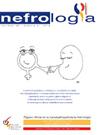糖尿病肾病与ELMO1和AGTR1基因多态性:系统综述
IF 2
4区 医学
Q2 UROLOGY & NEPHROLOGY
引用次数: 0
摘要
糖尿病肾病(DKD)是糖尿病的主要并发症之一,是世界范围内慢性肾脏疾病(CKD)和终末期肾脏疾病(ESRD)的主要病因。DKD的发病机制复杂,多因素;最近,遗传易感性已经获得了相关性,因为某些种族,如美洲原住民和墨西哥裔美国人,患这种疾病的风险更高。大量研究表明,包括ELMO1和AGTR1基因在内的单核苷酸多态性(snp)可能与DKD有关。目的对成人2型糖尿病(T2D)患者ELMO1和AGTR1基因snp与DKD相关性的科学文献进行系统综述。方法系统回顾PubMed、b谷歌Scholar、Worldwide Science和Science Direct数据库。出版物的选择遵循PRISMA(系统评价和Meta分析首选报告项目)提出的指南。纳入了报道成人T2D患者结果的原始文章。获得了snp的等位基因和基因型频率及其与DKD的关联信息。结果与DKD高风险相关最多的多态性是ELMO1基因的rs741301、rs1345365和rs10951509,而AGTR1基因的rss5186和rs388915。结论发生DKD的风险取决于多种因素,包括ELMO1和AGTR1基因多态性所带来的遗传易感性,但不能忽视患者的生活方式和环境因素。关于这些多态性与DKD关联的研究将使我们更好地了解发生这种疾病的不可改变的危险因素,并认识到不同研究种族之间的差异,这将使我们更快地发现易发生DKD的T2D患者,成为肾脏损害的早期标志,并对最易感的种族实施预防策略。本文章由计算机程序翻译,如有差异,请以英文原文为准。
Enfermedad renal diabética y polimorfismos de los genes ELMO1 y AGTR1: revisión sistemática
Background
Diabetic kidney disease (DKD) is one of the main complications of diabetes, the main cause of chronic kidney disease (CKD) and end-stage renal disease (ESRD) worldwide. The etiopathogenesis of DKD is complex and multifactorial; recently, genetic susceptibility has gained relevance since certain ethnicities, such as Native Americans and Mexican Americans, have a higher risk of developing this disease. Numerous studies have described that single nucleotide polymorphisms (SNPs), including those for ELMO1 and AGTR1 genes, could be associated with DKD.
Objective
To carry out a systematic review of the scientific literature on the association of SNPs of the ELMO1 and AGTR1 gene with DKD in adult patients with type 2 diabetes mellitus (T2D).
Methods
Systematic review in PubMed, Google Scholar, Worldwide Science, and Science Direct databases. The selection of publications was carried out following the guidelines proposed by PRISMA (Preferred Reporting Items for Systematic Reviews and Meta Analyses). Original articles that reported results in the adult population with T2D were included. Information about the allelic and genotypic frequencies of the SNPs and their association with DKD was obtained.
Results
The polymorphisms most frequently associated with a DKD higher risk were rs741301, rs1345365, and rs10951509 for the ELMO1 gene, whereas the rs5186 and rs388915 for the AGTR1 gene.
Conclusion
The risk of developing DKD depends on several factors, including the genetic susceptibility conferred by the ELMO1 and AGTR1 gene polymorphisms, without ignoring the patient's lifestyle and environmental factors. The studies about these polymorphisms’ association with DKD will allow a better understanding of non-modifiable risk factors for developing this disease and recognize the differences between different studied ethnicities, which would allow faster detection of patients with T2D susceptible to developing DKD, become early markers of kidney damage, as well as implementing preventive strategies on the most susceptible ethnicities.
求助全文
通过发布文献求助,成功后即可免费获取论文全文。
去求助
来源期刊

Nefrologia
医学-泌尿学与肾脏学
CiteScore
3.40
自引率
7.70%
发文量
148
审稿时长
47 days
期刊介绍:
Nefrología is the official publication of the Spanish Society of Nephrology. The Journal publishes articles on basic or clinical research relating to nephrology, arterial hypertension, dialysis and kidney transplants. It is governed by the peer review system and all original papers are subject to internal assessment and external reviews. The journal accepts submissions of articles in English and in Spanish languages.
 求助内容:
求助内容: 应助结果提醒方式:
应助结果提醒方式:


